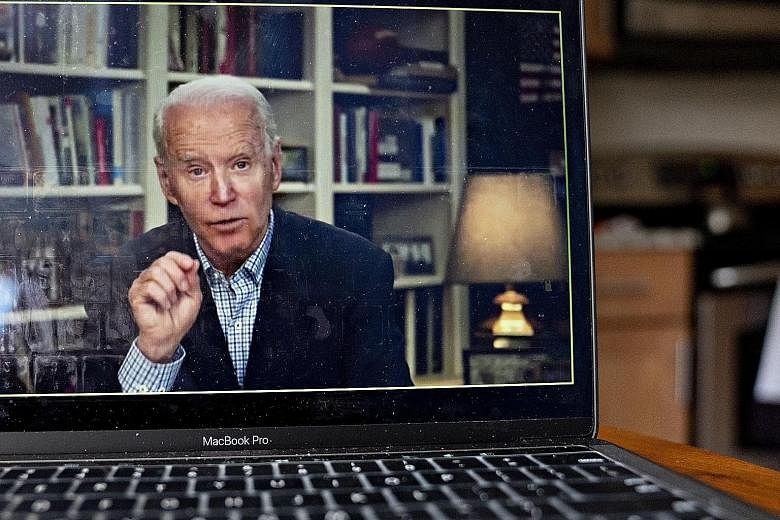WASHINGTON • Three weeks ago, Mr Joe Biden and rival Bernie Sanders were hosting rallies that attracted thousands. The pair often visited two states a day in their fierce and spirited battle for votes.
Today, they appear online as lonely candidates hunkered down in their homes, forced off the trail and into campaign reinvention mode as the intensifying coronavirus pandemic upends the Democratic presidential primaries, along with every other aspect of American life.
Mr Biden, the 77-year-old front runner, and Mr Sanders, the 78-year-old underdog, have paused all in-person campaigning. Live town halls are no more.
Several states have postponed their primaries on coronavirus fears - New York was the latest to do so on Saturday - and another debate between the two candidates is unlikely. The dozens of reporters who followed the two candidates for months have peeled away.
Even the Democratic National Convention set for mid-July, when the party officially nominates their candidate to challenge President Donald Trump in November, is at risk.
"We're doing a virtual campaign, if you like," Mr Sanders said last Thursday on National Public Radio.
While the Democrats are reduced to basement livestreaming, Mr Trump, also deprived of hosting his raucous rallies, is monopolising the spotlight.
The daily, nationally televised White House coronavirus task force briefings often stretch on for more than 90 minutes, with Mr Trump sometimes taking up an entire hour at the podium.
The Republican incumbent's handling of the crisis has earned mixed reviews, but his job approval rating has ticked up - and he is front and centre every day.
Desperate to stay relevant, Mr Biden and Mr Sanders are participating in multiple webcasts, including roundtables with their respective health adviser on the latest coronavirus developments.
The events are largely sombre, like a CNN virtual town hall last Friday on Covid-19, at which former vice-president Biden answered questions from voters in virus hot spots like New York.
Mr Biden also held a "virtual happy hour" last Wednesday in a bid to attract young voters.
No matter what the format, Mr Trump's rivals are gaining little national attention.
"For the time being, there is no real way for Biden or Sanders to break through," University of Virginia professor Larry Sabato, an expert on United States politics, said. "The pandemic is the only story that matters."
The Biden and Sanders campaigns were radically altered on March 10, when they both cancelled election night rallies in Ohio on the advice of local officials keen to avoid spreading the virus.
Mr Sanders, whose campaign has been more attuned to young Americans and their constant glances at social media, was quicker out of the online gate.
Mr Biden - despite tightening his grip on the nomination by easily winning many primaries over the last month - practically disappeared from the front-line campaign for days, prompting conspiracy theories about his health and whereabouts.
His communications director Kate Bedingfield assailed the "tinfoil hat crowd", explaining that Team Biden was busy building a TV studio in his basement.
"He doesn't have coronavirus, but he does have a camera now. So buckle up!" she tweeted.
Mr Biden has expressed optimism about the technology's effectiveness, but he admitted frustration at not being able to take more direct action against the crisis.
"Like anybody who cares about this, I'm chomping at the bit," he said in a webcast last Wednesday. "But I am where I am. And I hope I'm able to get my message across as we go forward."
Mr Sanders is a member of the US Senate, where he debated and voted for the US$2 trillion (S$2.85 trillion) economic rescue package that became law last Friday. For days, the self-proclaimed democratic socialist has focused his message on the coronavirus crisis, largely avoiding talk about the November election.
After Mr Sanders lost all three primaries on March 17, his campaign said he was returning home to Vermont to "assess" his campaign.
For Professor Sabato, the senator's chances are slim to none. "He's too far behind and when the remaining states actually get to vote, Biden is clearly favoured in most of them," he said.
But with a swirling health crisis creating an unprecedented delay in the primary face-off, nothing is definitive. "What actually matters is the course of the economy and the pandemic," Prof Sabato said. "Both are shaky right now."
AGENCE FRANCE-PRESSE

